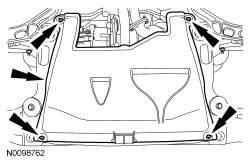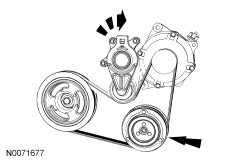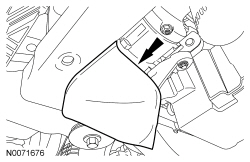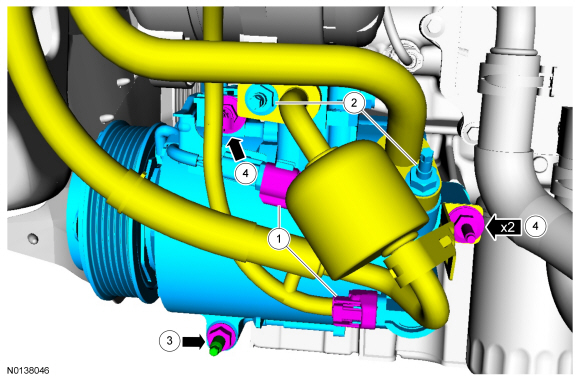SECTION 412-01: Climate Control
| 2014 Flex Workshop Manual
|
REMOVAL AND INSTALLATION
| Procedure revision date: 05/02/2013
|
Air Conditioning (A/C) Compressor — 3.5L GTDI, 3.5L Ti-VCT
Material
| Item
| Specification
|
|---|
Motorcraft® PAG Refrigerant Compressor Oil
YN-12-D
| WSH-M1C231-B
|
Removal and Installation
NOTICE:
If installing a new Air Conditioning (A/C) compressor due to an internal failure of the old unit, either a flushing procedure or system filtering procedure must be carried out to remove contamination from the A/C system. Failure to remove contamination from the A/C system, if present, will result in poor A/C performance and/or damage to the new A/C compressor and other components.
- If A/C flushing equipment is available, carry out flushing of the A/C system prior to installing a new A/C compressor. For additional information, refer to
Section 412-00
.
- If A/C flushing equipment is not available, carry out filtering of the A/C system after a new A/C compressor has been installed. For additional information, refer to
Section 412-00
.
- Install a new Thermostatic Expansion Valve (TXV), as directed by the A/C flushing or filtering procedure.
- Install a new receiver/drier as directed by the A/C flushing or filtering procedure.
NOTE:
Installation of a new receiver/drier is not required when repairing the A/C system, except when there is physical evidence of contamination from a failed A/C compressor or damage to the receiver/drier. Damage to the receiver/drier includes leaks in the receiver/drier, physical damage to the receiver/drier shell or desiccant, or moisture contamination. Moisture contamination results only from a complete loss of refrigerant and equalization of the refrigerant system pressure with atmospheric pressure for a period longer than one hour. If even a slight amount of positive refrigerant pressure is present in the system before repairs are carried out, the receiver/drier should not be replaced.
NOTE:
A new A/C compressor may come equipped with an A/C clutch disc and hub, A/C compressor pulley and A/C clutch field coil already installed. If these components are not pre-installed, it will be necessary to transfer these parts from the old A/C compressor to the new compressor prior to installation of the A/C compressor if suitable for reuse.
- With the vehicle in NEUTRAL, position it on a hoist. For additional information, refer to
Section 100-02
.
- If flushing of the A/C system has not been carried out, recover the refrigerant. For additional information, refer to
Section 412-00
.
- Remove the lower radiator splash shield.
- Remove the 4 underbody shield retainers and the underbody shield (if equipped).
- Release the tensioner and remove the drive belt from the A/C compressor pulley.
- Remove the 3 A/C compressor splash shield retainers and the splash shield (if equipped).
- Remove the A/C compressor.
- Disconnect the field coil and control valve electrical connectors.
- Remove the A/C compressor suction and discharge fitting nuts and disconnect the fittings.
- Discard the O-ring seals and gasket seals.
- To install, tighten to 15 Nm (133 lb-in).
- Remove the lower A/C compressor mounting nut, completely loosen the A/C compressor mounting stud.
- To install, tighten A/C compressor mounting stud to 9 Nm (80 lb-in).
- To install, tighten A/C compressor nut to 25 Nm (18 lb-ft).
- Detach the pin type retainer, remove the A/C compressor bolts and remove the A/C compressor.
- To install, tighten to 25 Nm (18 lb-ft).
- To install, reverse the removal procedure.
- Install new gasket seals and O-ring seals.
- If filtering of the refrigerant system is not to be carried out, add the correct amount of clean PAG oil to the refrigerant system. For additional information, refer to the Refrigerant Oil Adding procedure in
Section 412-00
.
- If filtering of the refrigerant system is not to be carried out, evacuate, leak test and charge the refrigerant system. For additional information, refer to
Section 412-00
.




